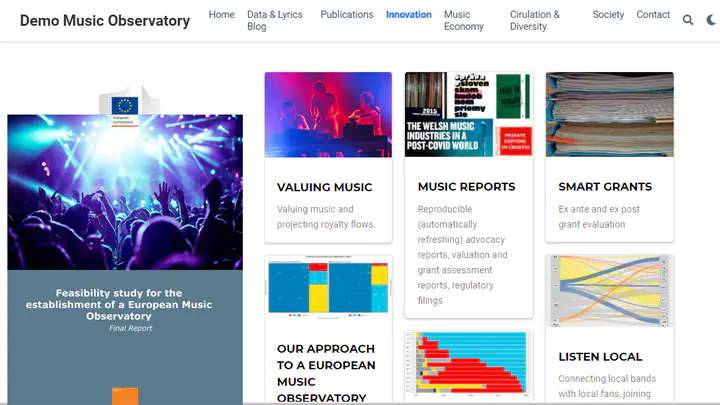Feasibility Study For The Establishment Of A European Music Observatory & The Demo Observatory

The Feasibility study for the establishment of a European Music Observatory was published on 13 November. Our private observatory, CEEMID was consulted in the creation of the Feasibility Study, and some of our recommendations found way into the consultant’s document. We created a Demo Music Observatory to provide a practical guidance on the decisions facing the European stakeholders, and to answer the questions that were left open in the Feasibility Study — particularly on data integration and the institutional model, where a wrong choice can lead to very long delivery time, quality control and budgeting.
We have been developing our Demo Music Observatory in the world’s 2nd ranked university-backed incubator program, the Yes!Delft AI Validation Lab since 15 September 2020. Our aim is to show a better organizational model, examples of research automation and other data integration innovation that can reduce the budgetary needs of the European Music Observatory by 80-90% and provide far more timely, accurate, and relevant service than most data observatories in Europe.
CEEMID has been creating a similar data observatory to the foreseen European Data Observatory, solely based on the contribution of about 60 European stakeholders. As the Feasibility Study suggests, we would be happy to transfer much of CEEMID’s content to the European Data Observatory, which could potentially fill up about 50-70% of the envisioned observatory. We are building our Demo Music Observatory based on the 2000 pan-European indicators collected by CEEMID since 2014.
Challenge Our Demo Observatory: Check out the Music Diversity & Circulation Pillar of our Demo Music Observatory. If you do not find what you are looking for, contact us — we will try to put the data there from our repositories.

The Feasibility Study is based on perceived data gaps between data needs of the European stakeholders and data availability. We have shown earlier this year to the European stakeholders that much of these data gaps are illusory. We would like to give about 50 indicators with full documentation, automated, weekly, monthly, quarterly, or annual refreshment for free for all music industry users. We would like to challenge the stakeholders to formulate data requests to us and think together on the ways how could the European music industry build a better observatory faster and with less cost.
Challenge Our Demo Observatory: Check out the Music Economy Pillar of our Demo Music Observatory. If you do not find what you are looking for, contact us — we will try to put the data there from our repositories.
The Feasibility Study concludes that a “European Music Observatory would require a very significant allocation of funds, beyond what could be currently expected from the possible budget of the future Creative Europe programme”. While the Feasibility Study provide cost options, or any cost-benefit analysis, we are certain that this is an exaggeration. Most European data observatories operate with an annual 20,000-200,000-euro subsidy. We want to show with our Demo Music Observatory what can be achieved with an annual budget of 20,000 euros, 50,000 euros, 100,000 euros or 200,000 euros.
Challenge Our Demo Observatory: Check out the Music, Society and Citizenship Pillar of our Demo Music Observatory. If you do not find what you are looking for, contact us — we will try to put the data there from our repositories.